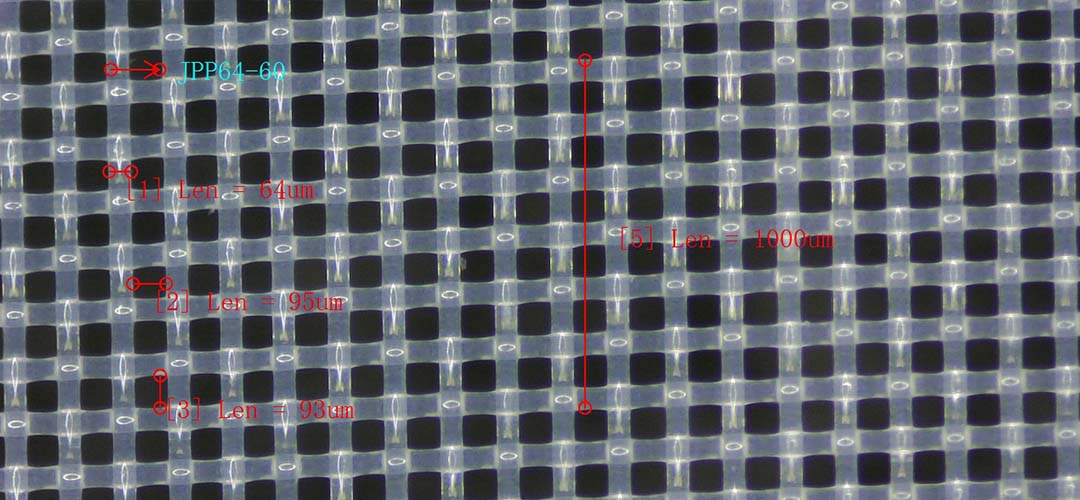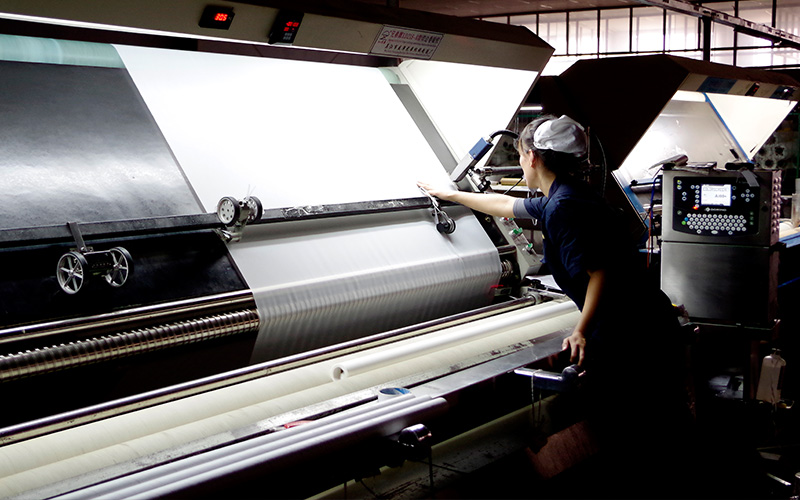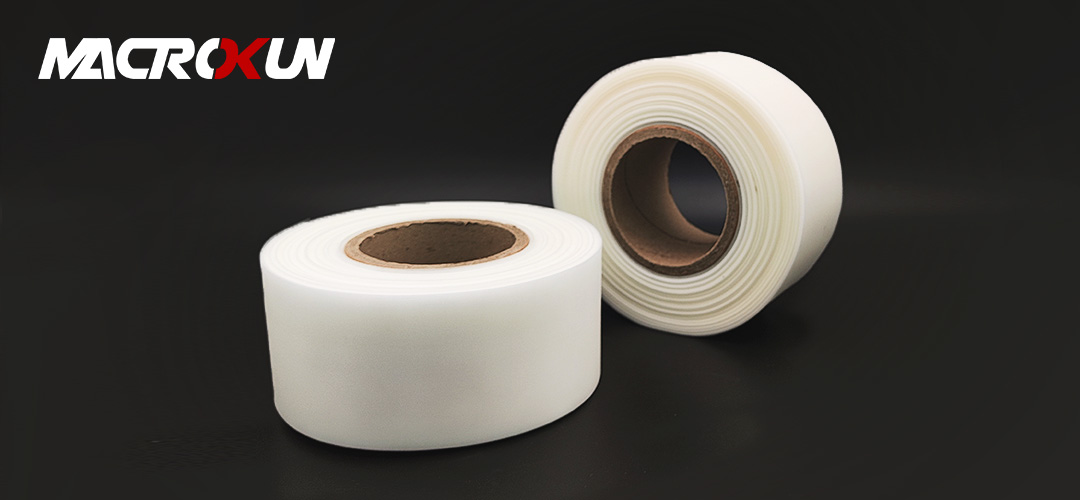Micron mesh fabric is a versatile material that has become increasingly popular in industrial settings due to its numerous benefits. One of the key advantages of using micron mesh fabric in industrial applications is its increased durability and longevity.
When it comes to industrial settings, durability is paramount. Equipment and machinery are subjected to harsh conditions, including high temperatures, heavy loads, and abrasive materials. Micron mesh fabric is specifically designed to withstand these challenging environments, making it an ideal choice for industrial applications.
Unlike traditional fabrics, micron mesh fabric is made from high-quality materials that are resistant to tearing, punctures, and abrasions. This means that it can withstand the wear and tear of daily use without deteriorating or losing its effectiveness. As a result, industrial equipment and machinery that are outfitted with micron mesh fabric are able to operate at peak performance for longer periods of time, reducing the need for frequent repairs or replacements.

In addition to its durability, micron mesh fabric also offers superior longevity. This means that industrial equipment and machinery that are equipped with micron mesh fabric can enjoy a longer service life, resulting in cost savings for businesses in the long run. By investing in micron mesh fabric, industrial companies can extend the lifespan of their equipment and machinery, ultimately improving their bottom line.
Furthermore, micron mesh fabric is highly resistant to corrosion and rust, making it an ideal choice for industrial settings where exposure to moisture and chemicals is common. This resistance to corrosion ensures that the fabric remains in optimal condition even in the harshest of environments, further contributing to its longevity and durability.
Another benefit of using micron mesh fabric in industrial settings is its versatility. Micron mesh fabric can be customized to meet the specific needs of different industries, making it a versatile solution for a wide range of applications. Whether it is used for filtration, separation, or protection, micron mesh fabric can be tailored to suit the unique requirements of each industrial setting.
Moreover, micron mesh fabric is lightweight and flexible, making it easy to install and maintain. This ease of use allows for quick and efficient installation, minimizing downtime and maximizing productivity in industrial settings. Additionally, micron mesh fabric is easy to clean and maintain, further reducing the overall cost of ownership for businesses.
In conclusion, the benefits of using micron mesh fabric in industrial settings are clear. From increased durability and longevity to versatility and ease of use, micron mesh fabric offers a range of advantages that make it a valuable investment for businesses. By choosing micron mesh fabric for their industrial equipment and machinery, companies can enjoy improved performance, reduced maintenance costs, and extended service life. Ultimately, micron mesh fabric is a smart choice for businesses looking to enhance the efficiency and reliability of their operations.
Micron mesh fabric is a versatile material that has become increasingly popular in industrial settings due to its numerous benefits. One of the key advantages of using micron mesh fabric is its ability to enhance airflow and ventilation in various applications.
In industrial settings, proper airflow and ventilation are crucial for maintaining a safe and comfortable working environment. Micron mesh fabric is designed to allow air to flow freely through the material, which helps to prevent the buildup of heat and moisture. This can be particularly beneficial in settings where machinery or equipment generates a significant amount of heat, as proper ventilation can help to prevent overheating and reduce the risk of equipment failure.
Additionally, enhanced airflow and ventilation can also improve air quality in industrial settings. By allowing fresh air to circulate throughout the space, micron mesh fabric can help to remove pollutants, dust, and other airborne particles that can be harmful to workers’ health. This can help to create a cleaner and healthier work environment, which can lead to increased productivity and employee satisfaction.
Another benefit of using micron mesh fabric for enhanced airflow and ventilation is its ability to reduce energy costs. By allowing natural airflow to cool and ventilate a space, businesses can reduce their reliance on mechanical ventilation systems, which can be costly to operate. This can result in significant savings on energy bills over time, making micron mesh fabric a cost-effective solution for improving airflow and ventilation in industrial settings.
Furthermore, micron mesh fabric is highly durable and resistant to wear and tear, making it an ideal choice for industrial applications where airflow and ventilation are essential. The material is designed to withstand harsh conditions, such as high temperatures, humidity, and exposure to chemicals, without losing its effectiveness. This means that businesses can rely on micron mesh fabric to provide long-lasting airflow and ventilation solutions that require minimal maintenance.
In conclusion, the use of micron mesh fabric in industrial settings offers a wide range of benefits, including enhanced airflow and ventilation. By allowing air to flow freely through the material, micron mesh fabric can help to prevent overheating, improve air quality, reduce energy costs, and provide a durable and long-lasting solution for maintaining a safe and comfortable working environment. Businesses that are looking to improve airflow and ventilation in their industrial settings should consider the many advantages of using micron mesh fabric as a cost-effective and efficient solution.
Micron mesh fabric is a versatile material that has become increasingly popular in industrial settings due to its numerous benefits. One of the key advantages of using micron mesh fabric is its improved filtration efficiency. This fabric is designed to trap particles of a specific size, allowing for more effective filtration of air, liquids, and other substances.
By using micron mesh fabric in industrial filtration systems, companies can achieve higher levels of cleanliness and purity in their processes. The tight weave of the fabric ensures that even the smallest particles are captured, resulting in cleaner air and water. This is particularly important in industries such as pharmaceuticals, food and beverage, and electronics manufacturing, where strict quality control measures are essential.
In addition to its superior filtration capabilities, micron mesh fabric is also highly durable and long-lasting. This means that companies can rely on this material to provide consistent filtration performance over an extended period of time, reducing the need for frequent replacements and maintenance. This not only saves time and money but also ensures that production processes can run smoothly without interruptions.
Another benefit of using micron mesh fabric in industrial settings is its versatility. This fabric can be customized to meet specific filtration requirements, allowing companies to tailor their filtration systems to their unique needs. Whether filtering out contaminants in water treatment plants or capturing dust particles in air filtration systems, micron mesh fabric can be adapted to suit a wide range of applications.
Furthermore, micron mesh fabric is easy to clean and maintain, making it a cost-effective choice for industrial filtration systems. Regular cleaning and maintenance of the fabric can help prolong its lifespan and ensure optimal filtration performance. This is particularly important in industries where cleanliness and hygiene are paramount, such as in medical facilities and cleanrooms.
Additionally, micron mesh fabric is environmentally friendly, as it can be recycled and reused. This makes it a sustainable choice for companies looking to reduce their environmental impact and promote sustainability in their operations. By using micron mesh fabric in their filtration systems, companies can contribute to a cleaner and healthier environment for future generations.
| Class | Mesh Size (/cm) |
Mesh Size (/inch) |
Thread Dia (um) |
Mesh Opening (um) |
Thickness (um) |
Net Weight (g/m2) |
| NL4/1950 | 4 | 10 | 550 | 1950 | 1100 | 307 |
| NL5/1500 | 5 | 13 | 500 | 1500 | 1000 | 318 |
| NL6/1267 | 6 | 15 | 400 | 1267 | 800 | 244 |
| NL7/1079 | 7 | 18 | 350 | 1079 | 700 | 218 |
| NL8/900 | 8 | 20 | 350 | 900 | 700 | 249 |
| NL9/861 | 9 | 23 | 250 | 861 | 500 | 143 |
| NL9/811 | 9 | 23 | 300 | 811 | 600 | 206 |
| NL10/750 | 10 | 25 | 250 | 750 | 500 | 159 |
| NL10/700 | 10 | 25 | 300 | 700 | 600 | 229 |
| NL12/583 | 12 | 30 | 250 | 583 | 500 | 191 |
| NL12/533 | 12 | 30 | 300 | 533 | 600 | 274 |
| NL14/514 | 14 | 36 | 200 | 514 | 340 | 142 |
| NL16/425 | 16 | 40 | 200 | 425 | 340 | 160 |
| NL20/350 | 20 | 50 | 150 | 350 | 255 | 113 |
| NL20/300 | 20 | 50 | 200 | 300 | 340 | 200 |
| NL24/267 | 24 | 60 | 150 | 267 | 255 | 135 |
| NL28/237 | 28 | 70 | 120 | 237 | 204 | 101 |
| NL30/213 | 30 | 76 | 120 | 213 | 204 | 110 |
| NL32/213 | 32 | 80 | 100 | 213 | 170 | 80 |
| NL36/178 | 36 | 90 | 100 | 178 | 170 | 90 |
| NL40/150 | 40 | 100 | 100 | 150 | 170 | 100 |
| NL43/153 | 43 | 110 | 80 | 153 | 136 | 70 |
| NL48/128 | 48 | 120 | 80 | 128 | 136 | 77 |
| NL56/119 | 56 | 140 | 60 | 119 | 102 | 50 |
| NL64/96 | 64 | 160 | 60 | 96 | 102 | 58 |
| NL72/89 | 72 | 180 | 50 | 89 | 85 | 45 |
| NL80/75 | 80 | 200 | 50 | 75 | 85 | 50 |
| NL100/57 | 100 | 250 | 43 | 57 | 73 | 46 |
| NL110/48 | 110 | 280 | 43 | 48 | 73 | 52 |
| NL120/48 | 120 | 300 | 35 | 48 | 60 | 37 |
| NL120/40 | 120 | 300 | 43 | 40 | 73 | 55 |
| NL130/42 | 130 | 330 | 35 | 42 | 60 | 40 |
| NL130/34 | 130 | 330 | 43 | 34 | 73 | 61 |
| NL140/36 | 140 | 350 | 35 | 36 | 60 | 43 |
| NL157/25 | 157 | 400 | 43 | 25 | 73 | 74 |
| NL180/20 | 180 | 450 | 39 | 20 | 66 | 68 |
| NL200/15 | 200 | 500 | 39 | 15 | 66 | 76 |
| NL220/10 | 220 | 550 | 39 | 10 | 66 | 84 |
| NL240/5 | 240 | 600 | 39 | 5 | 66 | 91 |
Overall, the benefits of using micron mesh fabric in industrial settings are clear. From improved filtration efficiency to durability, versatility, and sustainability, this material offers a range of advantages that can help companies enhance their filtration processes and achieve higher levels of cleanliness and purity. By investing in micron mesh fabric, companies can improve the quality of their products, reduce maintenance costs, and contribute to a more sustainable future.
Micron mesh fabric is a versatile material that has become increasingly popular in industrial settings due to its numerous benefits. One of the top advantages of using micron mesh fabric in industrial applications is its cost-effectiveness. This fabric is durable and long-lasting, making it a cost-effective solution for a wide range of industrial needs.
When it comes to industrial applications, cost is always a major consideration. Micron mesh fabric offers a cost-effective solution for a variety of industrial needs, from filtration to separation. Its durability and longevity make it a wise investment for companies looking to save money in the long run. By using micron mesh fabric, companies can reduce the need for frequent replacements and repairs, ultimately saving them time and money.
In addition to being cost-effective, micron mesh fabric is also highly efficient. Its fine mesh structure allows for precise filtration and separation, making it ideal for a wide range of industrial applications. Whether it’s filtering liquids, separating particles, or protecting equipment, micron mesh fabric can help companies achieve their goals with ease and efficiency.
Furthermore, micron mesh fabric is easy to work with, making it a popular choice for industrial settings. Its flexibility and versatility allow for easy customization to fit specific needs and requirements. Whether it’s cutting, shaping, or welding, micron mesh fabric can be easily manipulated to meet the demands of any industrial project.
Another benefit of using micron mesh fabric in industrial settings is its resistance to corrosion and wear. This fabric is designed to withstand harsh conditions and heavy use, making it a reliable option for companies operating in challenging environments. Its resistance to corrosion and wear ensures that it will maintain its integrity and performance over time, providing companies with a durable and dependable solution for their industrial needs.

Additionally, micron mesh fabric is lightweight and easy to transport, making it a convenient option for companies with multiple locations or projects. Its portability allows for easy installation and removal, saving companies time and effort in the long run. Whether it’s for temporary or permanent use, micron mesh fabric can be easily transported and installed, making it a practical choice for industrial applications.

Overall, the benefits of using micron mesh fabric in industrial settings are clear. From its cost-effectiveness to its efficiency and durability, this fabric offers a wide range of advantages for companies looking to improve their operations. Whether it’s for filtration, separation, or protection, micron mesh fabric is a versatile and reliable solution for a variety of industrial needs. By choosing micron mesh fabric, companies can save money, increase efficiency, and achieve their goals with ease and confidence.
Pre: Double Clamp Worm Screen Stretching Machine
Next: Nylon Mesh for Filter Netting: Customizable Solutions for Industry

MACROKUN has established long-term and stable cooperative relations with many transportation companies such as China Post, DHL, FEDEX, USPS, UPS, etc. Of course, MACROKUN can also provide air and sea transportation. The powerful logistics system enables all MACROKUN'S Printing Mesh, Filter Mesh and Filter Bags and so on to be easily and efficiently transported to any place. For quotes and inquiries, please email our sales team.





